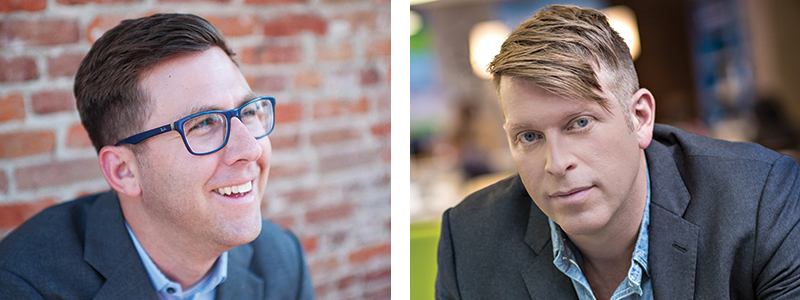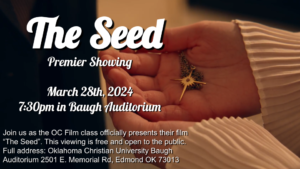Oklahoma Christian University is presenting a series to address the issue of declining church attendance and identity to help Christians understand cultural adversity.
Oklahoma Christian’s Intergenerational Faith Center is hosting speakers David Kinnaman, president of Barna Group, and Gabe Lyons, founder of Q, next Monday night. The two speakers will present their series “Good Faith Live.”
Kinnaman and Lyons co-authored the book, “Good Faith: Being a Christian when Society Thinks You’re Irrelevant and Extreme,” and will deliver a message based on its content. According to Oklahoma Christian’s Associate Professor of Youth Ministry Dudley Chancey, now is an appropriate time to address this topic.
“We know for a fact that in all of our protestant-type churches, and even Catholic churches, attendance is going down,” Chancey said. “Millennials are not going back to church. There are more people checking ‘none’ for their religious affiliation now than ever before.”
Chancey said he believes Christians need to hear the ideas the book has to offer, and what the two organizations stand for. He said it’s important for all Christians to act on the information they learn at this event.
“What we’re trying to do is get people to come and listen and find out ‘Why the world sees Christians as irrelevant or even extremist,” Chancey said.
According to Mel Latorre, missionary in residence at Oklahoma Christian, the topic of this event is not a new issue. Latorre said the church’s struggle to engage culture is a concept dating back to Biblical times and the early church.
“Jesus said love your enemies,” Latorre said. “That wasn’t out of nothing, there was a setting, there was great political tension. There is one good news, but there are four accounts of it. If nothing else that illustrates they had different audiences and they framed it differently.”
In a church surrounded by secular culture, Latorre said it is impossible to ignore the role it plays in the church’s dynamic.
“There is no ‘not engaging,’ you are always engaging,” Latorre said. “It is to question of how effective and to what degree and who is influencing whom.”
Tianna Allen, a Bible and ministry major, said she hopes the lecture provides opportunities for inspiration and growth, both spiritually and intellectually. She said it is important for students and others to hear different perspectives and experience diverse cultural ideas.
“Lectures like these spark curiosity and curiosity sparks discovery,” Allen said.
Allen said she believes churches need to recognize how both religion and culture shape the way Christians view the world and impact their individual lives.
“I think our goal as Christians should be unity,” Allen said. “We cannot have unity unless we understand how our culture and religion has shaped the way we look at things.”
Chancey said although the church sometimes seems to struggle in the current culture and generation, Jesus said the church will not die. Chancey also said he encourages those who attend the lecture to hear what Kinnaman and Lyons have to say, and use the knowledge they gain to preserve the church and its ideals.
“I’m not worried about the church going away, it’s going to be here until Jesus comes back, but the church as we know it — that we’ve invested our lives in, that we want our children to go to and all — is on the decline,” Chancey said. “What we want to do is have some dialogue and say, ‘Wow, what could we be doing right now to turn this around?’”
Latorre said it is important for churches to understand the culture around it and learn to frame their message to fit the audience. He said he not only hopes the audience will use the information to effectively engage culture, but also to use it as an opportunity to examine their own lives.
“I think we should always be self-assessing,” Latorre said. “Are we being God’s people? Are we acting in ways that bring glory to God? What misconceptions do we have? We shouldn’t ask ourselves what do we think God’s people should be, but what does God want His people to be.”
Chancey said he hopes students, faculty and staff will attend the event, as it is free to them.
Attendees can participate in a question and answer session and book signing, and have the chance to meet the authors at the end of the event.
The IFC Dialogue event will begin at 7 p.m. on February 6 in Hardeman Auditorium. Tickets are available for purchase online.














Be First to Comment